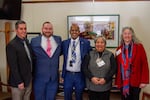This story originally appeared on Underscore.news.
Inside the wood paneled walls of the state Capitol on Monday, a balcony was lined with Indigenous people proudly wearing ribbon skirts, beaded earrings, cedar hats and hair in fresh braids. From the floor of the House chambers, Rep. Tawna Sanchez and Rep. Annessa Hartman, the only two Native American women to currently serve in Oregon, waved up at the row of familiar faces.
With a whack, the sound of the wooden gavel echoed and the chatter stopped.
“The house is now in session,” Speaker Pro Tempore Paul Holvey announced.

Oscar Arana, NAYA’s interim CEO, reads over talking points on bills that would impact Indigenous communities before the group broke into teams to meet with policymakers.
Jarrette Werk / Underscore News/Report for America
Sitting with dozens of community members along the balcony was William Miller, Blackfeet and Cherokee, government affairs manager at the Native American Youth and Family Center (NAYA) and executive director of the NAYA Action Fund. Miller wore a navy blue suit with a pink tie. His blue Eighth Generation socks added the finishing touch to his look as he held a folder titled “Native Advocacy in Action.”
“We bring staff and community down to the Capitol to advocate on critical issues impacting the Native community,” Miller said. “From substance use disorder to housing stabilization to health equity, and really everything in between.”
“It’s really important to have the Native community’s voice at the table, making sure that they’re advocating for these really important programs, these really important budget requests, and legislative asks,” added Oscar Arana, NAYA’s interim CEO.
‘Some of these bills and policies really do impact their everyday life’
Monday’s Legislative Day of Action was organized by NAYA and Future Generations Collaborative to bring Indigenous community members to Oregon’s state Capitol for conversations with policymakers on critical issues impacting their communities, such as safe and affordable housing, access to child care and economic equity.
“We’re trying to demystify, or trying to remove this feeling of it being hard or scary, really trying to make it more approachable for folks to participate and have their voice heard,” Arana said.
Natalyn Begay, NAYA Health Equity Coordinator and Policy Mode lead for Future Generations Collaborative echoed Arana on the importance of showing up.
“Some of these bills and policies really do impact their everyday life,” Begay, a citizen of the Navajo Nation said. She came prepared to advocate for early childhood education, mental health, housing and more.

Oregon State Rep. Tawna Sanchez, D-43rd District, Shoshone-Bannock, Ute and Carrizo and NAYA’s director of family services, and Rep. Annessa Hartman D-40th District, Haudenosaunee, the only two Native American women to currently serve in Oregon, wave up at the row of familiar faces.
Jarrette Werk / Underscore News/Report for America
Each legislative session, NAYA Action Fund’s leadership adopts a legislative agenda to advance policies that benefit the communities they serve.
“It’s a model that serves as an opportunity to advance the issues and concerns of our people,” Miller said.
The work Miller does today is deeply personal and directly tied to how he was raised around NAYA. He said he was able to give back to the organization now, because of what it has given him over the years.”I grew up going to NAYA receiving services ever since I was 10 years old,” Miller said. “So me as a return on investment, in my life, is living proof of the importance of services that NAYA provides.”
Miller, Blackfeet and Cherokee, said he remembers his family utilizing NAYA’s services, including housing, rental support, energy assistance, food boxes, after school programming and summer camps.
“NAYA is not just a wraparound organization, it is literally a family,” Miller said. “We’re stepping in the fight every day to literally and radically change lives for the better. And I think that being part of that is so beautiful.”
Miller says that his vision with policy and narrative change work is to bring more folks into these avenues of advocacy, from as early as infancy and all the way to the elderly, in ways that it benefits everyone.
“That creates that generational impact where folks are understanding how to navigate these systems of colonization in a way that is beneficial to the Native community,” Miller said.

On Monday, Feb 12, 2024 the Native American Youth and Family Center in partnership with Future Generations Collaborative brought more than two dozen Indigenous community members to Oregon’s State Capitol for the annual NAYA Action Fund's Legislative Day of Action. Attendees participated in a training geared toward understanding the Oregon Legislature before breaking into groups to talk with different representatives on critical issues impacting their communities, such as safe and affordable housing, access to child care, economic equity and more.
Jarrette Werk / Underscore News/Report for America
'Native communities and communities of color have been disenfranchised’
At the top of the agenda for NAYA and Future Generations Collaborative on Monday was an increase in funding for the Economic Equity Investment Program (EEIP) which passed the Oregon Legislature two years ago.
In 2022, the legislature allocated $15 million under the EEIP to build economic stability among disadvantaged people, families, businesses and communities in four key areas: ownership of land and property, entrepreneurship and business development, workforce and intergenerational wealth building.”
Native communities and communities of color have been disenfranchised and have not had access to these types of resources in the past,” Arana said, stressing the importance of the legislature allocating these funds over many years.
“You’re not going to solve economic inequalities in one year,” Arana said. “It’s really important that we continue to have these dedicated sources of funding that are meant to uplift the Native community and communities of color.”
In 2022, NAYA was a recipient of $900,000 in EEIP funds, and saw firsthand the benefits the program has on the Native community, Miller says. NAYA used those funds to help families with down payment assistance to purchase a new home or to make critical home repairs in current homes. The organization is currently working to acquire land for development of affordable housing and additional homeownership.
“We see the impact, and the value of the program is so profound on our community,” Miller said. “So a $30 million ask is really the next step in terms of continuing to safeguard and provide opportunities for economic advancement for Native communities,” Miller said.

Representatives from NAYA met with Oregon State Senator Kayse Jama, D-24th District, on Monday Feb 12, 2024 during NAYA Action Fund's Legislative Day of Action where they were advocating for critical issues impacting their communities, such as safe and affordable housing, access to child care and economic equity. L to R: Oscar Arana, NAYA’s interim CEO, William Miller, government affairs manager at NAYA and executive director of the NAYA Action Fund, Oregon State Senator Kayse Jama, D-24th District, Cecelia Lente, IDA coordinator at NAYA, and Erika Silver, director of housing and stabilization services at NAYA.
Jarrette Werk / Underscore News/Report for America
‘Set them up for success’
Another bill on the agenda was HB4082, which would establish a $50 million summer learning grant program to fund and immediately expand high-quality, culturally responsive summer enrichment opportunities. The goal is to boost youth engagement and support college and career readiness for Oregon students.”
The summer learning grant program was really funding our summer programming, and helping our youth have activities during the summer to learn more about science, math and technology and just getting them into a space where they could set them up for success,” Begay said.
Paying for childcare is extremely costly, especially for single parents. In some cases, Begay said, childcare can take up the majority of a parent’s paychecks.
“We want to make sure that our community can have a job, make a living wage, and also be able to know that their kid is taken care of,” Begay said.
Addressing education disparities through increased summer and after-school learning opportunities is vital with the current education system in Oregon, she added.
“That definitely needs to continue,” Begay said. “So we’re asking for support for establishing the $50 million learning grant program.”
‘Housing is the crisis of our lifetime next to climate change’
The final issue, and the only legislation that Gov. Tina Kotek is introducing in 2024, is Senate Bill 1537, a $500 million investment package aimed at solving the housing crisis in Oregon and creating affordable housing for Oregonians who struggle to make the state’s skyrocketing rents and mortgage payments.
“Housing in Oregon is under production, so this bill really is in an effort to produce more affordable housing,” Miller said.
The bill would create the Housing Accountability and Production Office with the overall goal to support housing production and address issues from local governments and developers over compliance with state housing laws. One downside to this bill, according to Miller, is a one-time tool for cities to add land for housing to their urban growth boundary.
“There’s some concerns attached to that, just given the environmental impact,” Miller said, “But we also need to realize that housing is a human right, and we have to work in a way that creates that right for all folks in our community.”
“Housing is the crisis of our lifetime next to climate change,” Miller added.
Correction: This story has been updated to attribute the opening of the House session on Monday, Feb. 12, 2024 to Speaker Pro Tempore Paul Holvey. It has also been updated to reflect the accurate title of the folder carried by NAYA Governmental Affairs Manager William Miller at the Oregon Capitol on Monday, Feb. 12. Underscore News regrets the errors.
Underscore is a nonprofit collaborative reporting team in Portland focused on investigative reporting and Indian Country coverage. It is supported by foundations, corporate sponsors and donor contributions. Follow Underscore on Facebook and X.



